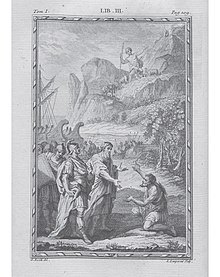Achaemenides

In the Aeneid of Virgil, Achaemenides (Greek: Ἀχαιμενίδης Akhaimenides) was a son of Adamastos of Ithaca, and one of Ulysses's crew. He was marooned on Sicily when Ulysses fled the Cyclops Polyphemus, until Aeneas arrived and took him to Italy with his company of refugee Trojans.[1][2][3]
His character seems to have been chosen by Virgil treating the Persian-origin name Achaemenes as Greek and extracting the meaning "he who waits with affliction".
Although not mentioned in the Odyssey of Homer, which the Aeneid is a sequel to, Achaemenides is significant for being one of two known members of Odysseus/Ulysses's crew in literature to survive the return journey to Ithaca, along with Macareus (as every ship besides the flagship was destroyed by the Laestrygonian giants, and those besides Odysseus on the last ship were drowned after his men devoured Helios's sacred cattle).
The episode also provides Virgil with an opportunity to show Aeneas' magnanimity in saving a member of Ulysses's crew, and bearing no grudge for Ulysses's major role in the destruction of Troy, Aeneas' home.
See also
- 5126 Achaemenides, Jovian asteroid
Notes
- ^ Virgil, Aeneid 3.613–614
- ^ Ovid, Metamorphoses 14.158
- ^ Schmitz, Leonhard (1867), "Achaemenides", in Smith, William (ed.), Dictionary of Greek and Roman Biography and Mythology, vol. 1, Boston, MA, p. 8, archived from the original on 2005-07-10, retrieved 2007-09-30
{{citation}}: CS1 maint: location missing publisher (link)
References
- Publius Ovidius Naso, Metamorphoses translated by Brookes More (1859–1942). Boston, Cornhill Publishing Co. 1922. Online version at the Perseus Digital Library.
- Publius Ovidius Naso, Metamorphoses. Hugo Magnus. Gotha (Germany). Friedr. Andr. Perthes. 1892. Latin text available at the Perseus Digital Library.
- Publius Vergilius Maro, Aeneid. Theodore C. Williams. trans. Boston. Houghton Mifflin Co. 1910. Online version at the Perseus Digital Library.
- Publius Vergilius Maro, Bucolics, Aeneid, and Georgics. J. B. Greenough. Boston. Ginn & Co. 1900. Latin text available at the Perseus Digital Library.
- v
- t
- e
| Deities | |
|---|---|
| Trojans |
|
| Phoenicians | |
| Others |
|
- The Avenger (1962)
- Eneide (1971–2)
- Eneyida (1991)
- Historia Brittonum (c. 828 history of Britain)
- Roman d'Enéas (1160 poem)
- Dido, Queen of Carthage (c. 1593 play)
- Amelia (1751 novel)
- The Dunciad (1729 poem)
- Eneida (1798 mock epic)
- Lavinia (2008 novel)
- Didone (1641 Cavalli)
- Achille et Polyxène (1687 Lully/Collasse)
- Dido and Aeneas (1688 Purcell)
- Didon (1693 Desmarets)
- Didone abbandonata (1724 libretto Metastasio)
- Didone abbandonata (1724 Sarro)
- Didone abbandonata (1724 Albinoni)
- Didone abbandonata (1726 Vinci)
- Didone abbandonata (1762 Sarti)
- Didon (1783 Piccinni)
- Dido, Queen of Carthage (1792 Storace)
- Les Troyens (1858 Berlioz)
- Laocoön and His Sons (25 BC)
- Aeneas, Anchises, and Ascanius (1619)
- The Dream of Aeneas (1660–65)
- Ascanius Shooting the Stag of Sylvia (1689)
- Dido building Carthage (1815)
- The Golden Bough (1834)
- "And Then There Was Silence"
- Gates of Fire
- Brutus of Troy
- Eneados
- The Golden Bough
- Parallels between Virgil's Aeneid and Homer's Iliad and Odyssey
- Political commentary of the Aeneid
- Sulpicius Apollinaris
- Trojan Horse
 | This article relating to an Ancient Roman myth or legend is a stub. You can help Wikipedia by expanding it. |
- v
- t
- e











